Under-the-Radar Round Up 2018, Part 2
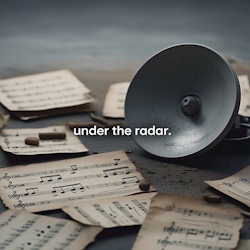 Original Reviews by Jonathan Broxton
Original Reviews by Jonathan Broxton
This is the second installment in my annual series of articles looking at the best “under the radar” scores from around the world. Rather than grouping the scores on a geographical basis, this year I decided to simply present the scores in a random order, and so this first batch includes five scores from several disparate locations – a stunning romantic TV drama from China, a political drama score for a TV series from Egypt, a drama score from India by one of the world’s most successful composers, and two standout works from Spain – a historical TV drama series, and a stunning documentary work about mysteries of science, nature, and space.
BEYOND THE CLOUDS – A.R. Rahman
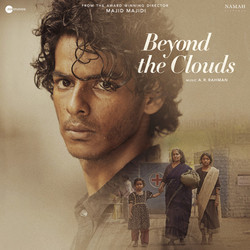 Beyond the Clouds is a Hindi-language Indian film written and directed Iranian filmmaker by Majid Majidi, under the production banner Zee Studios. It stars debutant actor Ishaan Khatter as Amir, a street hustler and drug dealer in Mumbai whose life is thrown into chaos when his naïve sister Tara (Malavika Mohanan) is jailed for a crime that he committed; torn between his loyalty to his crime boss employer and his love for his sister, Amir must find a way to get her out of prison without arousing the suspicions of the police, or his boss’s violent comrades.
Beyond the Clouds is a Hindi-language Indian film written and directed Iranian filmmaker by Majid Majidi, under the production banner Zee Studios. It stars debutant actor Ishaan Khatter as Amir, a street hustler and drug dealer in Mumbai whose life is thrown into chaos when his naïve sister Tara (Malavika Mohanan) is jailed for a crime that he committed; torn between his loyalty to his crime boss employer and his love for his sister, Amir must find a way to get her out of prison without arousing the suspicions of the police, or his boss’s violent comrades.
The score for Beyond the Clouds is by the reigning king of Indian film music, Oscar-winner A. R. Rahman. It’s second collaboration between Majidi and Rahman, after Muhammad: Messenger of God in 2015, and like that first score, I think it’s quite superb. However, somewhat shockingly, the reviews in India have singled out Rahman’s score for some quite scathing criticism: it was variously called ‘overly sentimental,’ ‘manipulative,’ ‘unmemorable,’ and ‘reminiscent of his earlier creations’. While I’m not familiar enough with Rahman’s history to speak to the latter issue, I cannot disagree more strongly with those first criticisms.
Stylistically the score has a great deal in common with his Oscar-winning work Slumdog Millionaire. At times it is wistful and dream-like, while at other times it is exhilarating and hyper-kinetic, capturing the frantic energy of the city of Mumbai and its chaotic underbelly. There are gorgeously romantic piano lines in cues like “Son of Mumbai” and “Second Thoughts,” dramatic and poignant strings in “Twist of Destiny,” more playful and warmly-hued woodwinds in “The Gift,” and haunting tragedy in “Hospital” and “The Family Leaves”. The use of a western vocal chorus in “Twist of Destiny” is especially powerful, while the prettiness of cues like “The Gift” or “Reunited” will charm anyone who enjoyed Rahman’s unexpectedly beautiful score for the American comedy Couples Retreat. These are counterbalanced by the breathless energy of pieces like “The Game of Life” and the conclusive “Holi” which feature sitars, tablas, pungi, and other traditional Indian instruments performed at an incomprehensibly fast tempo, and which are often underpinned by vivid contemporary synth pulses.
In addition to Rahman’s score there are three original songs – “Ala Re Ala,” “Ey Chhoye Motor Chala,” and the title track “Beyond the Clouds”. I especially enjoy the latter, a calming and peaceful track which features the breathy and exotic-sounding wordless vocals of singer Nikhita Gandhi. “Ala Re Ala” is more upbeat and celebratory, with an intoxicating collision of clattering instruments under the vocals, but “Ey Chhoye Motor Chala” is basically Hindi hip-hop and isn’t really to my taste at all.
As if it should not be plainly obvious by now, A. R. Rahman is one of the world’s truly great film composers, and Beyond the Clouds is yet another example of why Western film music audiences need to take his work in the Indian film industry seriously. This is a moving, romantic, beautifully conceived work that combines music of great delicacy and emotion with the relentless electricity of contemporary Indian life.
Track Listing: 1. Ala Re Ala (performed by Nikhita Gandhi feat. MC Heam and Dilshad Shaikh) (2:51), 2. Ey Chhote Motor Chala (performed by Sid Sriram feat. Arjun Chandy and MC Heam) (2:46), 3. Beyond the Clouds (performed by Nikhita Gandhi) (4:42), 4. Son of Mumbai (3:34), 5. The Game of Life (1:08), 6. Twist of Destiny (1:56), 7. The Gift (1:10), 8. The Family Comes Home (2:05), 9. Second Thoughts (2:57), 10. Akshi (2:24), 11. Hospital (3:02), 12. Full Moon (2:19), 13. Reunited (1:34), 14. The Family Leaves (2:58), 15. Holi (1:22). KM Music, 36 minutes 45 seconds.
LA CATEDRAL DEL MAR/CATHEDRAL OF THE SEA – Federico Jusid
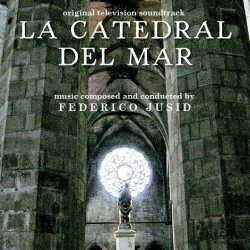 La Catedral del Mar is a Spanish-language TV series broadcast on the TV3 network, adapted from the novel by Ildefonso Falcones. It is set in 14th century Barcelona and follows the story of Arnau Estanyol, the son of a fugitive slave, who works as a stone mason building the cathedral of Santa Maria del Mar. Eventually Arnau manages to win his freedom, and slowly ingratiates himself into Spanish society, obtaining wealth and status; however, as he does so, he incurs the wrath of the noble class who disdain his common upbringing, while also attracting the attention of those carrying out the Spanish Inquisition. The series stars Aitor Luna as Arnau, and has an original score by the king of Spanish historical TV dramas, Federico Jusid.
La Catedral del Mar is a Spanish-language TV series broadcast on the TV3 network, adapted from the novel by Ildefonso Falcones. It is set in 14th century Barcelona and follows the story of Arnau Estanyol, the son of a fugitive slave, who works as a stone mason building the cathedral of Santa Maria del Mar. Eventually Arnau manages to win his freedom, and slowly ingratiates himself into Spanish society, obtaining wealth and status; however, as he does so, he incurs the wrath of the noble class who disdain his common upbringing, while also attracting the attention of those carrying out the Spanish Inquisition. The series stars Aitor Luna as Arnau, and has an original score by the king of Spanish historical TV dramas, Federico Jusid.
Anyone who has heard and become enamored with any of Jusid’s sumptuous scores for other historical epic TV series – Hispania, Isabel, Carlos Rey Emperador, La Corona Partida – will find La Catedral del Mar to be very much their equal. There is a rich classicism running through entire score, with emotional and powerful string writing, elegant brass countermelodies, light bright woodwind writing, and accents from an array of textures including pianos, harp, and gentle metallic percussion. Cues like the opening “On the Way to Freedom,” the bittersweet “Remorse,” the striking “Hormigal Drama,” and the sweeping and passionate “Discovery” are just gorgeous, with latter having more than a hint of 1990s James Horner about it.
Once in a while Jusid brings out his vocalists – a sole female singing tenderly in Latin in the wistful “Mother,” more exotic Middle Eastern inflections in “Hasdai’s Death,” the full choir chanting in an almost action setting in “Final Court Case” – and when he does so the effect is stunning, elevating the already magnificent orchestral music into something approaching the divine. At other times Jusid injects a hint of medievalism into his music through the use of more traditional instruments of the period alongside the standard contemporary orchestra, giving cues such as “Everything is Possible” and the exotic-sounding “On the Road to Barna” a slightly different lilting timbre. Conversely, cues like “Delerium” and “Inquisitor” are a little more abstract and appropriately atonal, while things like “Cholera and Destruction” and the superbly rousing “Via Fora” are filled with rolling drums and moments of percussive intensity to drive home their point, resulting in some wonderful moments of action and power.
The conclusive trio of cues – “Relieved,” “Honorable,” and “Chacona – Celestial Final” – see Jusid bringing all the key elements of the score together in a passage of music that begins with some brutal dissonance and evil-sounding explosions of sound, moves through some glorious string led tonality and specific cello-driven beauty, and brief sequences of playful warmth and rhythmic drama, before climaxing with a choral passage of genuine depth, illustrating perfectly Arnau Estanyol’s relationship with God and the cathedral that became his legacy.
Unfortunately the score for La Catedral del Mar has not been released on a commercial record label – this promo was created by Jusid for awards consideration purposes – but a few cues are available to hear via Jusid’s website at https://federicojusid.com/project/cathedral-of-the-sea/. As always, this review is intended to be a plea to record producers to release the score for commercial consumption, because music this good should not go unheard.
Track Listing: 1. On the Way to Freedom (3:19), 2. Mother (3:05), 3. Delirium (2:18), 4. Everything is Possible (2:16), 5. Hasdai’s Death (4:03), 6. Remorse (3:44), 7. Final Court Case (2:39), 8. Maria’s Death (2:54), 9. Aledis (2:54), 10. Hormigal Drama (1:46), 11. Joanet (3:17), 12. Discovery (2:10), 13. Cholera and Persecution (5:29), 14. A Walk Along the Beach (2:47), 15. Loneliness (2:10), 16. On the Road to Barna (1:55), 17. Via Fora (1:32), 18. Inquisitor (2:12), 19. Relieved (4:19), 20. Honorable (3:52), 21. Chacona – Celestial Final (2:09). Promo, 61 minutes 00 seconds.
FRONTIER OF LOVE – Mark Chait
 Frontier of Love is a Chinese-language television series starring actress Yin Tao and actor Timofey Katarev. It is a love story spanning over 50 years, which follows the affair between Wen Yiqu, a Chinese an undergraduate student of at the Beijing Broadcasting Institute, and a Russian radio announcer named Vica. Beginning in the 1950s, Wen and Vica meet and fall in love, but when the political relationship between China and the Soviet Union worsens, the Soviets pull all their citizens out of the country. Determined to be together, Wen and Vica take jobs in two cities on the border between the countries, where they try to maintain their relationship by listening to their voices through broadcast radio. It’s an unusual story told across more than 50 episodes in 2018, but it is given life by its extraordinary score by South African-born Shanghai-based composer Mark Chait.
Frontier of Love is a Chinese-language television series starring actress Yin Tao and actor Timofey Katarev. It is a love story spanning over 50 years, which follows the affair between Wen Yiqu, a Chinese an undergraduate student of at the Beijing Broadcasting Institute, and a Russian radio announcer named Vica. Beginning in the 1950s, Wen and Vica meet and fall in love, but when the political relationship between China and the Soviet Union worsens, the Soviets pull all their citizens out of the country. Determined to be together, Wen and Vica take jobs in two cities on the border between the countries, where they try to maintain their relationship by listening to their voices through broadcast radio. It’s an unusual story told across more than 50 episodes in 2018, but it is given life by its extraordinary score by South African-born Shanghai-based composer Mark Chait.
Although Chait has been working as a composer since the 1990s, his output has been limited mostly to short films, documentaries, and tiny indie features. Frontier of Love – if enough people actually hear it – could finally be his breakthrough score. It’s a score of quite exquisite beauty, anchored by several tremendously emotional cello passages that comment on the despair of lost love. Several cues stand out for their spectacular beauty, including the “Frontier of Love Main Theme,” the glorious “Wait for Me” in which the main theme is re-orchestrated for brass and rendered with contemporary electronic percussion, the yearning “Whispers of Love by His Death Bed,” the magnificent and emotionally devastating “The Miracle of Love”, and the sweeping and heartfelt pair of finale cues, “The Last Goodbye” and “An Epic Journey of Love,” which stand up against some of the most moving romantic cues written in recent years.
What’s clever about many of these themes is the way in which Chait blends Chinese and Russian music together; he uses traditional instruments from both cultures – pianos, cimbaloms and balalaikas from Russia, erhu, guzheng, and pipa from China – and writes melodic phrases that are stereotypically redolent of each country’s styles, but then has the instruments from one culture playing the melody of the other. It’s really quite superb, and perfectly encapsulates the series’s core idea where people of vastly different heritage can come together and fall in love.
Other cues of note include the lilting piano and string writing of “Wen Yiqiu’s Theme,” the quiet intimacy of “A Girl in Love,” and the intensity and passion of “Vica, the War Hero” which uses a more militaristic tone with prominent brass, tumultuous percussion, and choral outbursts to underscore his gallant appeal. I also really like the pretty woodwind and string combination in writing in the romantic “Affairs of the Heart,” and the bittersweet longing in the piano and cello writing in “Memories of the Past,” while the chorally enhanced and operatic “Desperate for the Father of My Child” reaches some tremendous heights of emotional anxiety, including some of the score’s most dissonant passages. There’s also an original song, “Moscow Nights,” which is performed by lead actors Tao and Karataev, and acts as the end credits for each episode.
As an introduction to the music of composer Mark Chait, Frontier of Love is a truly spectacular one, and sets the bar high in terms of any future soundtrack releases from him. Whether the success of this score will lead to assignments in North America remains to be seen – he seems to have carved out a niche for himself working in China – but irrespective of his geographical location, one cannot fail to be impressed with this glorious musical exploration of love and forbidden passion. The score is available as a digital download from Milan Records from all the usual online retailers, but unfortunately it appears that no physical CD exists at this time.
Track Listing: 1. Frontier of Love Main Theme (3:06), 2. Moscow Nights – Frontier of Love End Titles (performed by Yin Tao and Timofey Karataev) (3:47), 3. Wen Yiqiu’s Theme (3:54), 4. A Girl in Love (2:17), 5. Vica, the War Hero (2:24), 6. Wait for Me! (4:06), 7. Affairs of the Heart (2:54), 8. The Struggle Deep Within (1:22), 9. Desperate for the Father of My Child (4:06), 10. The Choice of a Simple Life (2:24), 11. Raising our Child (2:13), 12. Whispers of Love by His Death Bed (4:16), 13. A Yearning Through Binoculars (3:11), 14. The Miracle of Love (3:05), 15. Memories of the Past (4:04), 16. The Last Goodbye (6:03), 17. An Epic Journey of Love (3:29). Milan Records, 56 minutes 49 seconds.
HIDDEN WORLDS – Khaled Hammad
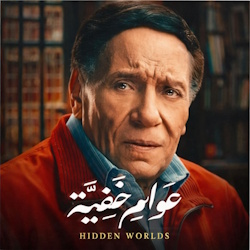 Every year, during the holy month of Ramadan, many Muslim-majority countries produce lavish TV mini-series, which are broadcast to enormous ratings and viewership numbers across the Arabic-speaking world. One of the most prestigious of these in 2018 is Hidden Worlds, a Saudi-Arabian/Egyptian co-production starring one of the biggest Arabic actors in the world, Adel Emam. It’s a political thriller-family drama in which Emam plays a prominent writer and novelist who accidentally finds a number of highly confidential documents incriminating high government officials of numerous crimes, including corruption. Despite some initial misgivings the writer insists on publishing them, a decision which puts his own life, as well as the lives of his family, in danger.
Every year, during the holy month of Ramadan, many Muslim-majority countries produce lavish TV mini-series, which are broadcast to enormous ratings and viewership numbers across the Arabic-speaking world. One of the most prestigious of these in 2018 is Hidden Worlds, a Saudi-Arabian/Egyptian co-production starring one of the biggest Arabic actors in the world, Adel Emam. It’s a political thriller-family drama in which Emam plays a prominent writer and novelist who accidentally finds a number of highly confidential documents incriminating high government officials of numerous crimes, including corruption. Despite some initial misgivings the writer insists on publishing them, a decision which puts his own life, as well as the lives of his family, in danger.
The score is by Khaled Hammad, a mixed-heritage Egyptian/Ukrainian composer who has been writing for movies and TV series across the Arabic world for many years. This is my first experience of his music and, I have to say, it’s quite wonderful. The main theme, as heard in the opening cue “Awalem Khafea Intro” is a full-on piece of orchestral melodrama, underpinned with mystery and passion, featuring a rolling piano lines, rousing trumpet fanfares, swirling strings, a sampled choir, and even an accordion. There’s a nostalgic throwback quality to it – you can imagine it accompanying one of those lavish 1980s TV mini-series – that is wholly appealing to my taste, but I can certainly see where some would find it to be a little too elaborate and grandiose. If I had to compare Hammad’s style to anyone, it would be probably be Georges Delerue – he shares a similar sense of lyricism and elegant Euro-romance with the late great Frenchman.
The sixteen tracks that make up the bulk of the score itself are mostly variations on the music heard in this core piece, but there are nevertheless several outstanding highlights. “Episode 1T1” features a softly romantic version of the main theme for strings and solo piano; “Episode 2T1” sees the main theme arranged with more urgency, with increased brass, more insistent synths, and a martial pulse; and “Episode 3T1” has a wonderful sense of Gothic mystery, which carries over into “Episode 4T2” with its chimes and cooing vocals. “Episode 6T1” returns to the French inflections with florid orchestrations for piano, strings, harp and accordion which are quite sumptuous. The conclusive “Awalem Khafea Outro” gives the main theme a final orchestral work-out, with bold and bombastic arrangements full of spectacle and extravagant pageantry.
Interestingly, the music contains virtually nothing which could be considered stereotypical ‘Arabic’ music, which is either a plus or a minus, depending on your point of view. The only cues which step even remotely into this world are “Episode 6T8” and “Episode 13T1,” which incorporate what sounds like an oud and a solo violin into the instrumental palette. Perhaps the only criticism one can level at the score is that it is desperately monothematic – the entire score is, basically, variations on the one melody – but when the melody is as good as the one Hammad has written here, that’s not necessary a bad thing.
Unfortunately the score for Hidden Worlds is not available for commercial purchase at this time – composer Hammad put this promo together for awards consideration purchases – so, as always, this review is intended to encourage soundtrack labels and producers to invest in the composer’s work. In the meantime, Hammad’s work for other projects can be heard through his Soundcloud page at https://soundcloud.com/khaled_hammad; I especially recommend his score for the 2014 film Cairo Time.
Track Listing: 1. Awalem Khafea Intro (4:01), 2. Episode 1T1 (2:05), 3. Episode 1T2 (2:05), 4. Episode 2T1 (2:06), 5. Episode 3T1 (3:52), 6. Episode 4T1 (3:15), 7. Episode 4T2 (3:14), 8. Episode 5T1 (3:15), 9. Episode 5T2 (3:07), 10. Episode 6T1 (2:08), 11. Episode 6T2 (2:08), 12. Episode 6T8 (1:52), 13. Episode 7T1 (1:29), 14. Episode 8T1 (1:46), 15. Episode 8T6 (1:46), 16. Episode 13T1 (1:50), 17. Episode 15T1 (1:40), 18. Awalem Khafea Outro (3:06). Promo, 44 minutes 54 seconds.
OTROS MUNDOS – Carlos Martín Jara
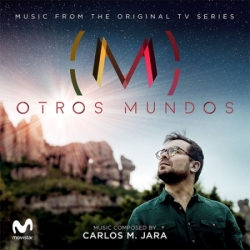 Otros Mundos is a six-part Spanish documentary television series broadcast on the Movistar network. Written and narrated by acclaimed author Javier Serra, Otros Mundos takes a fascinating look at many of world’s greatest historical unexplained mysteries and supernatural phenomena, including Ancient Egypt’s ‘Secret of Fatima,’ disturbing testimonies from people who claim to have encountered extraterrestrials, unlocking the secrets of so-called crystal skulls, stories from King Alfonso VIII’s reign during the Spanish Reconquista period, and detailed investigations in to symbols hidden in famous works of art.
Otros Mundos is a six-part Spanish documentary television series broadcast on the Movistar network. Written and narrated by acclaimed author Javier Serra, Otros Mundos takes a fascinating look at many of world’s greatest historical unexplained mysteries and supernatural phenomena, including Ancient Egypt’s ‘Secret of Fatima,’ disturbing testimonies from people who claim to have encountered extraterrestrials, unlocking the secrets of so-called crystal skulls, stories from King Alfonso VIII’s reign during the Spanish Reconquista period, and detailed investigations in to symbols hidden in famous works of art.
The score for Otros Mundos is by Spanish composer Carlos Martín Jara, who first broke though in 2017 with his score for the historical mini-series Reinas (although, for that score, he was simply billed as Carlos Martín), and it’s absolutely outstanding. Written for a full orchestra and choir, with special emphasis on solo pianos and solo cello, Martín’s score is a deeply emotional and multi-faceted score which approaches the documentary’s subject matter with a sense of awe and reverence, and no shortage of emotion. At times there is even a deeply religious quality to the music – think Miklós Rózsa or Georges Delerue at their most reverent – which is enormously appealing.
In a score full of standouts, several cues are worth mentioning. The imposing “Main Theme” is purposeful and dramatic; this is counterbalanced by the beautiful, innocent “A New Sighting,” which has just the right amount of wide-eyed wonderment in its woodwind lines and slow, moving crescendos. “Erase Una Vez Javier” and parts of “Munaiz Theme” have a gorgeous, romantic sweep that sounds like something John Williams might have written in the 1980s – and that’s absolutely intended to be a compliment. Perhaps the pinnacle of the score’s emotional content is “The Miracle We Need,” which comes across like a glorious prayer.
King Alfonso’s VIII’s reqonquista has militaristic underpinnings, but regularly rises to embrace moments of glorious orchestral and choral majesty, notably in “Message from the Virgin”. The entire ‘Fatima’s Miracle’ sequence is a wonderful piece of orchestral neoclassicism, which begins by being underpinned with more war-like percussion, features a searingly beautiful duet for cello and piano in “Her Last Will,” goes on to introduce a sentimental Spanish guitar to the same melody in “The Miracle,” and concludes with a mysterious, moody arrangement of the theme for clarinet and orchestra.
Once in a while Martin also engages in some creative, energetic action music replete with purposeful brass figures; parts of “A New Sighting,” the superbly dramatic pair “La Batalla de las Navas de Tolosa” and “The Boy and ther Bull” with their throbbing cello rhythms and spectacular string writing, and the brass triplet extravaganza in the aforementioned “Munaiz Theme” are especially impressive. The 7-minute “Little Green Men” is Martín’s exploration of mysterious space music, a combination of moody instrumental tones and rampant orchestral-and-choral bombast which is occasionally reminiscent of some of Danny Elfman’s efforts in the genre – listen for those howling trombones! “Space Travel” has all the energy and excitement and awe-inspiring intimacy one would expect from a track like that.
Track Listing: 1. A Child’s Discovery (1:31), 2. A New Sighting (1:24), 3. Alfonso VIII – A Message from the Virgin (3:03), 4. Alfonso VIII – Breaking into the Mystery (3:03), 5. Discovering New Worlds (1:18), 6. Erase Una Vez Javier (1:47), 7. Fatima’s Miracle – Attack Against the Pope (1:05), 8. Fatima’s Miracle – Her Last Will (2:19), 9. Fatima’s Miracle – Lot of Questions (0:57), 10. Fatima’s Miracle – Suspicions (2:13), 11. Fatima’s Miracle – The Miracle (1:36), 12. Fatima’s Miracle – Arriving to Formigao (3:29), 13. Fatima’s Miracle – The Miracle in Their Eyes (0:49), 14. In This World (2:22), 15. La Batalla de las Navas de Tolosa (3:30), 16. Little Green Men (7:33), 17. Munaiz Theme (3:51), 18. Navas de Tolosa (2:57), 19. Opening Otros Mundos (performed by Daniel Rodrigo) (0:54), 20. Otros Mundos Main Theme (1:27), 21. Space Travel (4:51), 22. Sweet Childhood (2:05), 23. The Boy and the Bull (3:01), 24. The Miracle We Need (1:32), 25. Through a New View (1:49), 26. Wonderful Things (2:05). Rosetta Soundtrack Records RRCD-26, 62 minutes 40 seconds.


Good to read that at least over the under-the-radar scores we are aligned.
Except for the Khaled Hammad score, which I didn’t encounter yet, all your scores mentioned are either in my TOP15 or in the 51-album longlist where it was derived from.
Looking forward to the rest.
Always look forward to your “Best Of” posts…lots of scores I’ve literally never heard of to explore 🙂
Thank you for continuing to do this, there are far too many entirely mediocre score releases these days and you are doing the world (or at least our niche of it!) a great service by continuing to highlight the ones that are most deserving of attention. 🙂